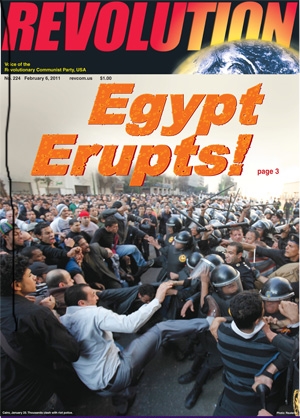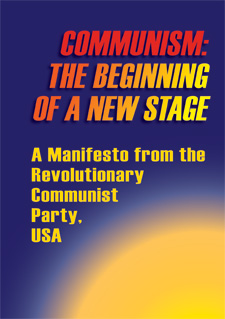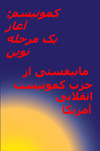From A World to Win News Service:
Wave of Protest Sweeps Out Algeria’s Hated President
| revcom.us
Revcom Editors’ Note: The following is an excerpted and lightly edited contribution from A World To Win News Service.
In light of the events in Algeria, and now Sudan, we really encourage readers to examine the orientation and guidance captured in Bob Avakian’s 2011 statement on the Arab Spring in Egypt, on what is sorely needed at such times of upsurge and ferment.
April 5, 2019. A World to Win News Service. People began flooding into Algiers’ main square in the early morning today before it filled up. By afternoon the square and surrounding streets were solidly packed with people celebrating their victory, the fall of the hated President Abdelaziz Bouteflika. The same happened in cities throughout the country. The hundreds of thousands in the streets—and millions more broadly—felt a once-in-a lifetime exuberance. They were dealing a powerful blow to the hogra,1 the humiliation of the people, in their individual lives and as a nation, at the hands of a corrupt clique, obsequious to foreign powers and cruel to the masses of people.
There had been massive demonstrations every Friday for seven weeks since the president, in power for twenty years, announced he would run for a fifth term. First, in an effort to appease the anger, he reversed his decision about running again. Finally, he was forced to resign immediately. People’s joy is mixed with a growing determination to drive out a whole regime, now seeking to save itself by throwing overboard its leading figure. The protesters invented a new word, “Fridayize,” vowing to keep going until they also drove out the loyalists to whom Bouteflika had handed over the government.
But now the army has stepped up to openly establish itself as the real power. Despite the reputation it still enjoys for winning the country’s independence in 1962, after eight years of French genocidal warfare to maintain its colonial domination, people who are now largely united against a detested president are going to come up against an institution at the core of the state Bouteflika administered—the state that has kept the country dominated by imperialism economically and in every sphere and corner of society. This subservience is the real source of the nation’s humiliation and the stunting of the people’s aspirations.
This is one of those moments when millions of people begin to throw off some of the weights that have kept them down, refuse to let themselves be crushed not only materially but in their souls, and reaffirm their dignity and determination to make their own future. Such moments are crucial, and can be positive. But it is also true that we’ve been here before and can’t ignore lessons paid for in so much blood over and over again. For the people have not yet made a revolution, and unless they do, in the most thoroughgoing way, the forces of the old order, in Algeria and especially the imperialist powers and their system, will maneuver to assert control and rule, and at times even take revenge on the people—as has been seen only too often, including in the recent Arab Spring.
Algeria’s victory in its war of liberation back in the 1960s heralded the defeat of the old colonialist system that ruled over most of Africa, the Middle East and Southeast Asia. Young people have unfortunately seen little like the country’s effervescent, hopeful atmosphere in its early years. It welcomed liberation fighters and revolutionaries from all over, including Europe and the U.S.
Yet that struggle was not led by a genuinely scientific approach that could revolutionize the country on every level, from its economy (a system based on exploitation and driven by the needs of the global imperialist system) to all the social relations of domination and the thinking they give rise to and enforce. Instead of following the basic path socialist China was taking in those days under the revolutionary leadership of Mao Zedong, building an economy that could allow independence and make it possible to change the whole society and support world revolution, Algeria’s leadership tried to obtain a “better deal” for the nation within the existing framework of nation states, by maneuvering among the imperialists, including the by-then imperialist Soviet Union, as well as France and the U.S. The U.S. has been a growing factor especially in recent years. The temporary “success” of Algeria’s turn to oil and gas exports as the motor of its economy allowed Bouteflika’s government to buy time and support, but this only made the country more fatally dependent on imperialist capital and markets. Today’s youth, the majority of the population, face not only hardships but no prospects of a real future.
Algeria’s streets have remained mostly silent for two decades, since the 1990s civil war between the army and Islamic fundamentalists when both sides massacred countless civilians and terrorized intellectuals. After cancelling an election the Islamists had won, the army eventually brought in Bouteflika. Observers say that the country mainly remained on the sidelines during the 2011 “Arab Spring” because of the fear of another such period. Today, a great many Algerians feel that their rebirth has only taken its first step. Many hope that a constituent assembly and new elections can put the country on a new path. But in neighboring Tunisia, following the toppling of the hated French-dominated Ben Ali regime in 2011, prolonged haggling between old regime forces and their old and new rivals helped gradually smother the revolutionary spirit. As for the army, its leaders are part of the post-independence, imperialist-dependent bourgeoisie no less than Bouteflika’s family members and cronies—and competitors—in private enterprise.
Look at Egypt. There, after the 2011 toppling of U.S.-backed Mubarak, people thought that the army could play some kind of positive role. “The people and the army are fingers of one hand,” they chanted, acting on hope rather than evidence. The youth movement thought it could “use” the army to oust a post-Mubarak Islamist government. It ended up under the rule of a general whose regime combines subservience to the U.S. and Israel (and their ally, fundamentalist Saudi Arabia) with religious and other forms of backwardness to impose the dark night covering Egypt today.
France has already thrown down a marker demanding political continuity in Algeria—which means the continuity of imperialist domination—and the U.S. and other powers, increasingly squaring off against each other in North Africa, are not going to want to leave it to the Algerian people to decide. In Algeria, like everywhere else, the army and the whole state apparatus will have to be confronted and overthrown in a revolution guided by the long-term goal of ending the global imperialist system and all forms of exploitation and oppression.
1. Hogra means contempt, disdain, and exclusion, and also describes an attitude that condones and propagates violence against the many, the forgotten and marginalized masses of people. [back]
On March 17, 2017, A World to Win News Service (AWTWNS) announced its transformation into a more thorough-going tool for revolution based on Bob Avakian’s new synthesis of communism. Read its “Editorial: Introducing a transformed AWTWNS” here.

EGYPT 2011: MILLIONS HAVE HEROICALLY STOOD UP...THE FUTURE REMAINS TO BE WRITTEN
A Statement By Bob Avakian, Chairman of the Revolutionary Communist Party, USA
February 11, 2011
It is important first to make clear what, in basic terms, we mean when we say the goal is revolution, and in particular communist revolution. Revolution is not some kind of change in style, or a change in attitude, nor is it merely a change in certain relations within a society which remains fundamentally the same. Revolution means nothing less than the defeat and dismantling of the existing, oppressive state, serving the capitalist-imperialist system—and in particular its institutions of organized violence and repression, including its armed forces, police, courts, prisons, bureaucracies and administrative power—and the replacement of those reactionary institutions, those concentrations of reactionary coercion and violence, with revolutionary organs of political power, and other revolutionary institutions and governmental structures, whose basis has been laid through the whole process of building the movement for revolution, and then carrying out the seizure of power, when the conditions for that have been brought into being—which in a country like the U.S. would require a qualitative change in the objective situation, resulting in a deep-going crisis in society, and the emergence of a revolutionary people in the millions and millions, who have the leadership of a revolutionary communist vanguard and are conscious of the need for revolutionary change and determined to fight for it.
As I emphasized earlier in this talk, the seizure of power and radical change in the dominant institutions of society, when the conditions for this have been brought into being, makes possible further radical change throughout society—in the economy and economic relations, the social relations, and the politics, ideology and culture prevailing in society. The final aim of this revolution is communism, which means and requires the abolition of all relations of exploitation and oppression and all destructive antagonistic conflicts among human beings, throughout the world. Understood in this light, the seizure of power, in a particular country, is crucial and decisive, and opens the door to further radical change, and to strengthening and further advancing the revolutionary struggle throughout the world; but, at the same time, as crucial and decisive as that is, it is only the first step—or first great leap—in an overall struggle which must continue toward the final goal of this revolution: a radically new, communist world.
Bob Avakian, BAsics 3:3
Get a free email subscription to revcom.us:



